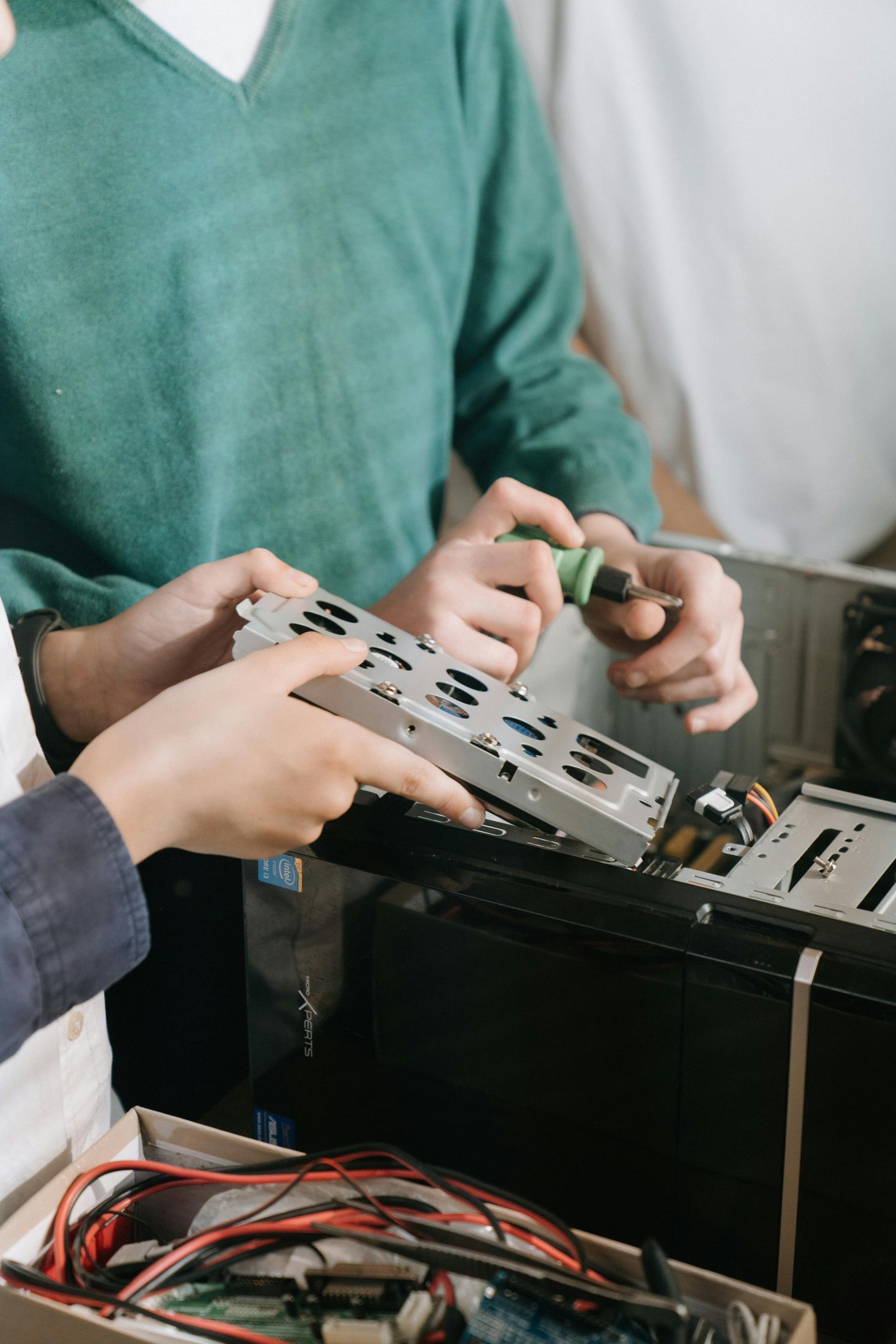Feng Shui Office Guide 2025: Create Harmony, Boost Productivity & Well-Being
Finding balance and energy flow in the modern workplace

By Jamieson Lee Hill, Tech author and Self-Development enthusiast since 1993.
What I Know About Feng Shui
I first became aware of Feng Shui in the mid-1990s, when it began to gain popularity in the West. I remember two principles that stood out:
- You shouldn’t place your desk between a window and a door, because this creates a “restless” flow of energy, with
chi moving too quickly through the space.
- You should always keep your toilet lid shut when not in use, otherwise, you risk letting your wealth and good fortune “drain away.”
Funnily enough, I have largely adhered to both since the mid-90s. I thought it was time to revisit this ancient art. Let’s explore its origins and how you can apply it to your office…
What is Feng Shui and Why Does it Matter at Work?
Feng Shui first became popular in the West in the late 20th century, as growing interest in holistic practices made their way into everyday life.
Early applications of Feng Shui here were often seen in interior design and architecture. Designers used furniture placement, colour, light, and other techniques to create spaces that felt balanced, harmonious, and more conducive to well-being.
At its core, Feng Shui is about improving the flow of energy, aka chi, in your home or office.
A Brief History of Feng Shui
"Feng shui, sometimes called Chinese geomancy, is a traditional form of geomancy that originated in ancient China and claims to use energy forces to harmonize individuals with their surrounding environment. The term feng shui means, literally, 'wind-water' (i.e., fluid).”
Source: Wikipedia, 2025
It is amazing to think that Feng Shui began in ancient China over 3,000 years ago. Wind and water are regarded as two natural forces that shape the land and symbolise the flow of energy.
Since ancient times, people believed that landscapes and waterways guided the flow of qi aka chi. Qi or chi is the universal life energy in Taoism and Eastern mysticism.
Feng Shui goes beyond simple room and home or office placement; it weaves together insights from astronomy, astrology, architecture, cosmology, geography, and the natural shape of the land.
The Origins of Feng Shui and Building
In the beginning, Feng Shui was not about where to put furniture or how to decorate a room. It was actually a guiding set of principles for choosing the right places to build homes, temples, and even entire cities.
Builders searched to construct dwellings that were in harmony with nature. For example, a mountain behind for safety and open land in front would welcome new opportunities. These choices were not only symbolic but also practical and functional, i.e. they would help occupants avoid strong winds and stay close to water for farming and trade.
As the years passed, Feng Shui became closely linked with Taoist philosophy and Chinese medicine. Both focus on the concept of balance between yin and yang, and between people and nature. Feng Shui is an ancient system that has shaped Chinese life, culture, and design for centuries.
Feng Shui Office Basics Everyone Can Try
In today’s high-pressure work environments, especially in the tech industry, your workspace can have a big impact on your mood, productivity, and health.
Feng Shui offers simple yet powerful ways to improve your office setup. These changes only require thoughtful placement of your surroundings, rather than big renovations.
“The ultimate goal of applying Feng Shui in the workplace is to enhance the overall well-being of employees. By creating a balanced, harmonious environment, employees are likely to experience reduced stress levels, improved mental health, and a greater sense of satisfaction and engagement in their work.”
Source:
Tim Larson, Unispace, 2025
Your workplace obviously shapes how you feel every day and it can affect your productivity. The layout of your desk, the light in your office, and even the clutter on your table can all influence your mood and performance.
Feng Shui offers some surprisingly simple insights into how to arrange and improve your environment. A lot of Feng Shui is just common sense.
The Five Feng Shui Elements in Your Office
Let’s start with a key principle of Feng Shui, which is the Five Elements. Feng Shui uses the five elements, wood, fire, earth, metal, and water, to bring balance into a space.
Wood
Wood is linked with growth and creativity. You can bring this into your office with plants, wooden furniture, or even artwork that shows trees or nature. It’s a reminder to keep ideas flowing and projects moving forward.
Fire
Fire represents energy, passion, and drive. You don’t need an actual flame in your office to use this element. Splashes of red, orange, or bright lighting can add that extra spark of motivation and flair to your space.
Earth
Earth is about stability and support. This can be as simple as using earthy tones like beige, terracotta, or soft yellows, or choosing solid, heavy objects like a sturdy desk. These touches ground you and bring a sense of calm.
Metal
Metal is linked with focus and clarity. Think of items made from steel, brass, or even white and grey colours. A sleek metal desk organiser or a polished lamp can help cut through clutter and support clear thinking.
Water
Water symbolises flow, calm, and fresh ideas. You can bring water into your office with a small fountain, an aquarium, or even images of rivers and oceans. The colours blue and black also carry water energy, adding a sense of openness and calm.
Balance not Clutter
Balancing these five elements doesn’t mean crowding your office with symbols of all of them. The idea is to choose a mix that feels natural and works with your personality. When the elements are present in harmony, your office becomes a space that encourages focus, creativity, and productivity.
Using the Bagua Map for Office Feng Shui
"(The Bagua Map) It helps to… enhance beneficial energy, balance positive vibrations, focus intentions, identify and correct subliminal messages, and to create a sacred space that nourishes your mind, body, and spirit."
Source:
Mindvalley Blog, July 2024
The Bagua map, sometimes called the Pa Kua, is a simple Feng Shui tool that links parts of your home or office to different areas of your life. Each section of the map represents something important like career, health, wealth or relationships.
By adjusting or improving a space in your environment, you can give a boost to the matching area of your life. The Bagua shows how your life and environment are connected. Think of it as an energy grid that you lay over your office.
You start by aligning the map with the wall that has your main entrance. From there, you can see which parts of your office connect to which areas of life. For example, the zone linked to your career is usually right at the front and centre, while the far back corner is connected to wealth and prosperity.
You can use the zones as a guide for placement. Maybe you put a healthy green plant in the wealth corner to encourage growth, or hang inspiring artwork in the creativity zone. In the career zone, keeping things clear and well-lit can symbolise an open path forward.
The Bagua map gives you a framework to personalise your space. Instead of random décor, every object has a place and a purpose.
Feng Shui Desk Placement: The Command Position
One thing I discovered is that where you place your desk really matters in Feng Shui. In Feng Shui, the best spot is called the “command position.” It means being able to see the door without sitting directly in line with it.
This little change can make you feel more secure and calm in your office environment because you are aware of what’s happening around you. In plain English, you can see who is approaching, which I guess taps into our survival instincts as a species for thousands of years.
The problem I had with my home office is that it is small, and the best location for light and view is the window. That means my back is to the door. But to be honest, the only worry I have is being caught off guard, is my cat scratching me!
Support from Behind
Another interesting point I read was the importance of what’s behind your desk. Having a solid wall at your back in Feng Shui creates a sense of stability and support. It makes you feel more grounded and less distracted by movement behind you. This is helpful in a busy office.
Clearing Clutter with Feng Shui
A cluttered desk often reflects a messy mind. In Feng Shui, clutter blocks the natural flow of energy, leading to stress and mental fatigue. For tech professionals juggling multiple projects, a tidy desk can improve focus and efficiency. Using storage boxes and a regular clear-up routine to keep your workspace in order is the way forward.
A quick tidy-up each day can bring order and calm. Do it now!
Feng Shui and Office Light and Colour
Something that stood out to me is the importance of light and colour in your office. Feng Shui teaches how much light and colour shape the way we feel at work. For instance, a bright, airy room with plenty of natural light can lift your mood. Colours also play their part, e.g. red can give you energy, yellow sparks creativity, while blue and green help keep things calm and focused.
Natural light is considered the best source of positive energy in Feng Shui. It boosts mood, supports healthy sleep patterns, and reduces eye strain. If your office lacks windows, you could invest in some full-spectrum lamps to mimic daylight. Bright, well-lit spaces help sustain energy levels during long hours at the screen.
Remember, even small touches, like artwork or accessories, can shift the atmosphere of your office. So bring some light and colour to your office environment to inspire you.
Plants for Fresh Energy in your Feng Shui Office
I was walking past the entrance to an office the other day, and I saw two large plants placed on either side of the staircase. It really struck me as an excellent way to bring natural charm and inspiration to an office. This not only inspires staff but also visiting customers and lifts the vibe of your office.
Plants not only clean the air but also make the space feel more alive. Even one small plant on a desk can soften the sharpness of a tech-heavy office and give you a little pocket of calm during the day. Plants bring “life force” into your office, improving air quality and adding a touch of nature.
The green colour is calming, helping to counteract the mental strain of fast-paced, screen-focused work.
Comfortable Chair = Greater Focus
We often overlook the importance of a good chair. This is something that Feng Shui highlights. My wife is a stickler for this. She bought us both chairs designed for back comfort. Also, I use a yoga balancing cushion for added comfort. Consider investing in a supportive, adjustable seat to help prevent back pain and fatigue. This can make a big difference if you spend long hours at your desk.
Your chair is the foundation of your working posture. A supportive, adjustable chair can prevent back pain, neck tension, and fatigue. These are common complaints in tech jobs. When your body feels comfortable, your mind can focus better on problem-solving and creativity.
Time to Feng Shui your chair?
Personalise the Office Space with Feng Shui
One of the most enjoyable parts of Feng Shui is making your workspace feel personal. Small touches can inspire you through the day and remind you that your desk is more than just a place to work.
You might add your favourite crystal (I love amethyst, and I have a massive chunk of it). Just looking at it lifts my mood as it is so beautiful. Nothing mystical, just appreciating nature. Or simply keep a ceramic mug you love in the office to make it feel more like home.
Photos, artwork, or even a vision board can also give your eyes and mind a break from the screen. If you’re staring at a blank wall, adding something meaningful there can instantly change the atmosphere and lift your mood.
Fresh, Clean Air
In Feng Shui, the flow of air is crucial. Good air quality is essential for clear thinking and sustained energy. In tech environments with lots of electronics, the air can become dry and stale.
So open the windows when possible, use an air purifier, or add plants that filter toxins. Fresh air keeps both body and mind alert.
Stopping Noisy Environments
Feng Shui highlights the importance of having peace to focus on your work. Noise can quickly break concentration, and if you are like me, noisy environments mean I can’t focus.
My solution is listening to music on decent headphones. That blocks out all the noisy construction work in my area. I also use binaural beats music to focus.
Final Reflections on Feng Shui and Your Office
The real point of using Feng Shui at work is to make people feel better. A balanced space can lower stress, boost mental health, and make the whole office feel more enjoyable to be in. If the environment feels positive, people are happier and are more likely to work well as a team. It sets the tone for your company culture.
Your Office Feng Shui Task
Here are 3 simple steps to refresh your workspace today:
- Reposition your desk into the command position, so you can see the door without sitting directly in line with it.
- Clear the clutter from your desk and entryway to keep energy flowing smoothly.
- Personalise your space with something meaningful, such as a photo, a favourite mug or an inspiring artwork.
AI FENG SHUI CONSULTANCY IN 4 STEPS
This is a quick Feng Shui consultancy drawing on data from the internet and using this article. Do the following:
- Sketch your office or home and feed it into ChatGPT or other AI tool
- Next, feed in a Bagua Map from Google to the AI tool.
- Copy and paste this article into the AI tool, e.g. ChatGPT, Gemini, Perplexity.ai, etc.
- Ask the AI tool to give an AI Feng Shui consultancy for your office or home using the internet from authoritative Feng Shui sources, the Bagua map, your sketch and this article.
I came up with this idea while writing the article. It gave me some great tips for my home office and flat layout.
SOURCES
- https://www.unispace.com/insights/fengshui_modernworkplace
- https://www.therange.co.uk/blog/furnishings/feng-shui-an-introduction/#:~:text=Feng%20shui%20(wind%2Dwater),in%20different%20aspects%20of%20life
- https://www.officernd.com/blog/feng-shui-office-layout/
- https://www.flexopus.com/en/blog-posts/feng-shui-for-the-workplace
- https://www.newsweek.com/feng-shui-expert-furnish-room-command-position-1602833
- https://youtu.be/IvFU84-jRF8?si=J6lxKrUYPMKcJcdu
- https://www.youtube.com/watch?v=TOeUqMwOrA8&ab_channel=SaraJaneHo
- https://limobelinwo.com/en/how-to-apply-feng-shui-in-offices/#:~:text=For%20this%20reason%2C%20bright%20and,to%20encourage%20calm%20and%20concentration.
- https://www.thespruce.com/how-to-feng-shui-your-desk-4129191
- https://www.youtube.com/watch?v=F5Tt3LoygCQ&t=4801s
ABOUT THE AUTHOR
Jamieson Lee Hill is a regular blogger for IP House London. Since 2018, he has worked in marketing and is Head of Content and Copywriting for an international franchise and another UK-based company.
Hill writes articles about the Tech industry, SMEs, Websites and Digital Marketing, Self-Development and many more sectors.
Hill is also the Editor for a weekly newsletter from Blam Digital and regularly reviews AI tools, software and tips. He has 26 years of experience as a lecturer, teacher and college manager.











